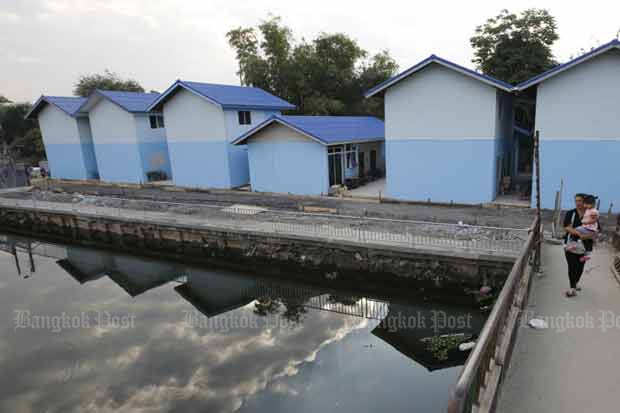
The government will let domestic and foreign investors join with government agencies in building housing projects through the public-private partnership (PPP) scheme for low-income earners and the lower-middle class under the Pracha Rat Home scheme.
Deputy Prime Minister Somkid Jatusripitak yesterday authorised the state-owned GH Bank and the National Housing Authority (NHA) to design the housing development plan for low-income and lower-middle earners nationwide.
The two organisations are required to complete the plan within six months.
"Previously I authorised GH Bank to join state agencies and private firms to build housing projects for low-income earners, but the initiative has yet to get off the ground," said Mr Somkid. "The government is very ambitious to help those low-income earners, lower-middle class people as well as state officials who have just started working to have their own houses or empower them to at least rent the houses. So the public-private partnership scheme will be allowed in this ambitious plan."
Mr Somkid said demand for housing projects remains high in Thailand, as many low-income earners and lower-middle-class people have yet to own their own houses, adding the PPP, once allowed, will be good for the property market.
He said the PPP for the housing projects will be introduced as soon as possible.
"I'm pretty old now and I really need to help those low-income earners to have their own houses," said Mr Somkid. "The cabinet is expected to approve the new measures to help low-income earners soon."
He said the government is also committed to supporting the development of housing projects for elderly people, as Thailand has become an ageing society.
According to The National Economic and Social Development Board (NESDB), Thailand has 11.2 million elderly people accounting for 17% of the population. By 2036, that number will rise to 19.5 million or 30% of the total population.
Thailand is defined as an "ageing society" because people aged 60 and older make up more than 10% of the total population.
Thanks to birth control efforts by previous governments, Thai births plummeted to 700,000 in 2015 from more than 1 million on average during 1963-83.
The NESDB estimates that the government will shoulder 1.4 trillion baht worth of social welfare spending in 2028, up from 400 billion in 2013.
Finance Minister Apisak Tantivorawong recently said a new aid package worth 46 billion baht for low-income earners would go before the cabinet for approval in the next few weeks.
The package covers free rides on public buses and trains, subsidies for utility bills, and fares on inter-provincial buses. It is scheduled to come into force on Oct 1, the start of the 2018 fiscal year.
Funding will be allocated from the Pracha Rat Fund for Low-Income Earners worth 50 billion baht, established in May to reduce income disparity.
